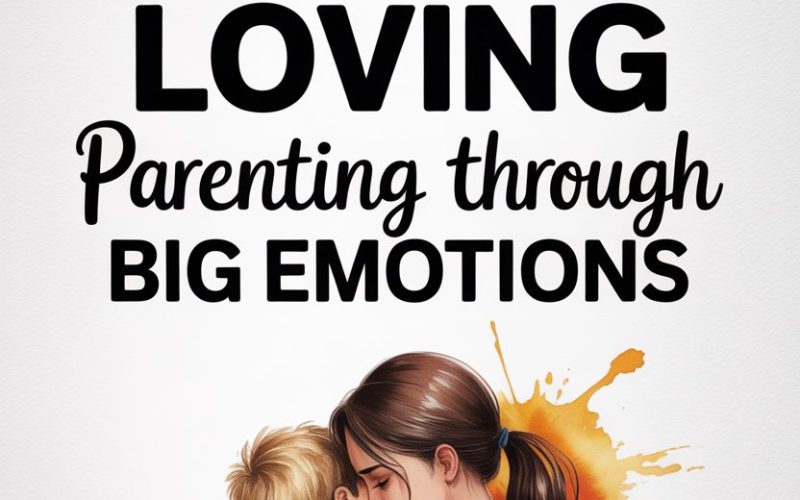Ever had one of those days when your child’s emotions hit like a tidal wave—and yours aren’t far behind? You’re not alone.
Parenting comes with a side order of big feelings, sometimes turning your living room into a dramatic stage worthy of Shakespeare.
The challenge isn’t avoiding anger (good luck!), but loving each other through it.
Your Anger Is Normal, Not a Parenting Fail
No matter how many mindfulness podcasts you listen to, anger is part of life with children. The endless questions, spilled juice, defiant declarations (“I will never wear shoes again!”)—none of it means you’re failing when you feel annoyed.
In fact, research from the American Psychological Association suggests that occasional parental anger is not only normal but inevitable.
The real trick? How you handle it.
Kids learn emotional regulation by watching the trusted adults in their lives. If you explode, apologise, and show them that repair is possible, you’re teaching them one of the most important relationship skills out there.
No need for a gold sticker. Just showing up, again and again, matters.
Why Kids’ Emotions Get So Big
Ever seen a toddler in full meltdown mode because their banana broke in half? It’s not just stubbornness.
Young children’s brains process emotion quite differently to adults, according to child development experts. They simply don’t have the wiring yet to “keep calm and carry on.”
As kids grow, their emotional storms become more sophisticated but can still catch you off guard. Teens, for example, might seem icy and withdrawn one minute, shouting the next.
Blame it on hormone-fuelled brain development and a need for independence—both guaranteed to test even the most patient parent.
Understanding what’s developmentally normal can bring a sense of relief. Your child isn’t “bad” or “manipulative.” They’re human, and their feelings are very, very loud.
The Power of Naming Feelings
Many parenting guides talk about “emotional intelligence” as if you need to coach your four-year-old for a job interview. But the basics are much simpler.
Kids (and, frankly, adults) need help recognising what they’re feeling. This is called “affect labelling,” and a UCLA study found that simply naming emotions can help the brain calm down.
Next time your child is boiling over, try saying, “You seem really angry that the game ended,” or, “You’re so disappointed we can’t go to the park.”
You’re not brushing aside the behaviour that might follow (“No biting, please!”), but you’re letting your child know you see them. That act of empathy can take the heat out of the moment for both of you.
Big Emotions Don’t Mean Big Punishments
When children act out, the urge to clamp down with major consequences is strong—especially if you’re running on caffeine and crumbs. But harsh punishments rarely teach what you want.
Instead, they can ignite more resentment and shame, which tend to fuel the very behaviour you’re trying to curb.
Gentle discipline strategies—like time-ins, logical consequences, or simply sitting with your child until they’ve cooled off—work better in the long run.
Dr. Laura Markham, a clinical psychologist and author, argues for connection before correction. “When children feel understood, they’re much more likely to listen,” she explains in her book “Peaceful Parent, Happy Kids.”
You’re not losing your authority by being compassionate. You’re creating the safety net that lets your child bounce back next time.
Calming Yourself in the Moment
Easier said than done, right? When your blood pressure spikes, your logical brain often leaves the building.
One trick: slow down your breathing. Inhale for four, exhale for eight. That’s it. The longer exhale cues your nervous system to stand down.
Another favourite—walk away (safely). Announce, “I need a moment to calm down. I’ll be back when I’m ready to talk.” You’re modelling self-control and buying precious seconds before you say something you’ll regret.
If you’re feeling especially angry, imagine you’re narrating the scene to a friend.
“You won’t believe it, but she just flung her broccoli across the room. Again.” Sometimes, a little mental distance is all you need to keep perspective.
Repair: The Relationship Superglue
Nobody gets it perfect. Apologies aren’t just for grown-ups; they patch up little cracks in your connection with your child.
If you snapped, stomped, or yelled, say sorry—genuinely. “I was really cross and I yelled. That wasn’t okay. I love you, even when I’m angry.”
This doesn’t open the floodgates for disrespect or chaos. Instead, it teaches your child that everyone makes mistakes—and that love isn’t cancelled when feelings run high.
Repeated repair is what builds trust. Over time, your child learns that anger comes and goes, but love doesn’t budge.
When Your Child’s Anger Scares You
Sometimes, the intensity of a child’s rage can push every button you have.
Maybe you’re dealing with aggressive outbursts, destruction, or words that sting. These aren’t just “big feelings”; they can feel truly overwhelming.
If your child’s anger is frequent, explosive, or leads to dangerous behaviour, it’s smart to seek extra support. Counsellors, paediatricians, and parenting experts can offer strategies tailored to your family.
You’re not failing by asking for help. You’re showing your child that problems can be solved—even the prickly, complicated ones.
Don’t forget to look after yourself, too. Parenting a child who struggles with self-regulation is exhausting.
You deserve support, friends who “get it,” and time for yourself (yes, even if it’s just a solo loo break without someone shouting your name).
Building Calm Moments into the Day
You can’t prevent every meltdown, but tiny routines can make a world of difference. Try a silly handshake at breakfast, a few minutes of cuddling before bed, or a quick game of “Would You Rather?” during the school run.
Kids need positive attention like they need air. When you fill their tank with silly, loving connection, you might notice the emotional storms lose some of their sting.
And if you’re thinking, “But I don’t have time for one more thing!”—pick one small ritual and stick with it. Tiny moments count.
Emotion Coaching for Real Life
Some days, emotion coaching feels about as practical as yoga with a goat in the kitchen. Yet even small efforts help.
The Gottman Institute offers a simple approach: notice, name, and validate feelings, then set limits on behaviour.
If your child is lobbing Lego across the lounge, acknowledge: “You feel angry.” Set the limit: “We can’t throw things.” Offer an alternative: “Let’s stomp our feet together instead.”
You’re teaching your child to express anger safely—not to bottle it up, or let it explode.
Dealing with Your Own Emotional Triggers
Nothing brings out ancient childhood wounds quite like your own child’s tantrum. The urge to “win” the power struggle, or retreat into guilt, is strong. This is normal.
If you notice certain behaviours send you over the edge, get curious. Sometimes, writing things down or talking it out with a trusted friend can help you spot patterns.
Self-awareness isn’t about blaming your own parents, or “fixing” yourself overnight, but understanding what pushes your buttons. Then, you can choose how to react (most days, anyway).
Rewriting the Script: It’s Never Too Late
Maybe you’ve spent years yelling and feel trapped by old habits. Or maybe you’re new to big-kid emotions and panicking that you’ll “mess up” your child forever.
Here’s the good news: children are incredibly resilient, especially when love and repair are part of the story.
Small changes—pausing before reacting, naming feelings, apologising—have a ripple effect. It’s never too late to build a relationship based on warmth and trust, no matter how loud the shouting gets.
When Emotions Run High, Love Wins
Anger and love are not opposites—they’re often tangled together in the wild, wonderful mess of parenting. Every time you stay connected through your child’s big feelings (and your own), you’re laying the groundwork for emotional strength.
No parent gets it right every time, but showing up with honesty and compassion? That’s the real win.
Your children might not remember every outburst, but they’ll remember how you put the pieces back together: loving, flawed, and all in.
Breathe deep. You’ve got this.




